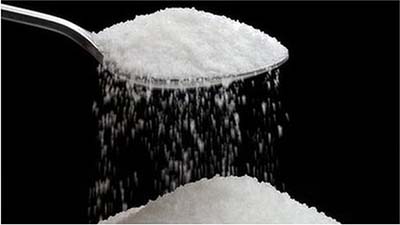

As someone who has always been addicted to sugar, it took a while before I understood that it is linked to brain chemistry (dopamine) that produces a high like drugs. I am not into chocolate (caffein addiction), or cakes and carbs, but things like "peeps" are my guilty pleasure and are made from pure sugar. I am lucky not to be programmed with other addictions but sugar is a big one. It can ruin your teeth, cause various health issues including diabetes and the endless issues that go along with it.

Scientists are working their way toward a consensus that sugar is addictive. While some researchers are still hesitant to liken sweet stuff to drugs or alcohol, the evidence is accumulating to explain why some of us really struggle to resist or moderate our sugar intake.
When you eat something loaded with sugar, your taste buds, your gut and your brain all take notice. This activation of your reward system is not unlike how bodies process addictive substances such as alcohol or nicotine - an overload of sugar spikes dopamine levels and leaves you craving more. Read more ...
6 Signs You're Eating Too Much Sugar Epoch Times - September 14, 2014

1. You're Fatigued
If you're constantly tired and reaching for your next pick-me-up, chances are you're on a blood sugar rollercoaster. When we're tired, we often reach for even more sugar to counteract the fatigue, which leads to a cycle of sugar-fueled highs and lows. If you decide to cut out sugar, give your body a few days to adjust 'and then you'll begin to feel your energy levels even out. Boost your energy naturally.
2. You Have Sugar/Carb Cravings
Sugar is extremely addictive, and the more of it you eat, the more you crave. If you're constantly on the hunt for something sugary throughout the day, your body and brain are probably hooked on the sweet stuff. You'll find that the less sugar you eat, the less you'll crave it. When you cut out refined sugar and artificial sweeteners, you'll reduce your sugar cravings and begin to realize how sweet fruit is! Tips for sugar cravings.
3. You Have Skin Issues
Sugar can wreak havoc on your skin - causing acne, dryness and overall skin imbalances. Your skin is a mirror of what's going on inside your body, so the inflammation that sugar causes on the inside will show up on the outside. If you have pesky skin issues that won't go away, examining your sugar intake could be a smart idea. Check out these tips for glowing skin.
4. You're Depressed or Anxious
Sugar is one of the biggest contributors to mood disorders like depression and anxiety. There's a reason they call it the 'sugar blues' - sugar can put you on a rollercoaster of emotions that can be hard to get off of until you make a commitment to give up the sweet stuff. In addition to depression and anxiety, you may experience brain fogginess and stress. You'll feel your mood lighten when you begin to lay off the sugar. Enhance your mood with food.
5. You Get Sick A Lot
Sugar suppresses the immune system 'so it impairs your body of its ability to fend off stress and chronic illness. If you're always 'coming down with something' or frequently taking over-the-counter drugs for the common cold, chances are your diet 'particularly your sugar intake 'could be the culprit. A cleanse that puts you on an elimination diet can help your immune system tremendously!
6. You're Overweight
You probably know by now that fat doesn't make you fat - sugar does! A diet high in sugar and refined carbohydrates can definitely keep on the extra weight. If you've been trying to lose weight by eating a low fat diet, but still including sugars and other carbohydrates, it's not helping your cause. Try cutting out the sugar and even most of the grains for a couple of weeks and see if it makes a difference. Sugar can also wreak havoc in the gut, which hinders weight loss too. Learn more about your gut and weight loss.
Sugar 'not addictive' says Edinburgh University study BBC - September 15, 2014

People can become addicted to eating for its own sake but not to consuming specific foods such as those high in sugar or fat, new research suggests. Edinburgh University scientists found no strong evidence for people being addicted to the chemical substances in certain foods. They found the brain does not respond to nutrients in the same way as it does to addictive drugs such as cocaine. However, people can develop a psychological compulsion to eat. This is driven by the positive feelings that the brain associates with eating, the researchers said.
The study, which examined the scientific evidence for food addiction as a substance-based addiction, is published in Neuroscience and Biobehavioral Reviews. The scientists said it was a behavioral disorder and could be categorized alongside conditions such as a gambling addiction. They suggested tackling the problem of obesity should be moved away from food itself and instead focussed on the individual's relationship with eating.
Mental disorders
The researchers also said the current classification of mental disorders, which does not permit a formal diagnosis of eating addiction, could be redrawn. However, more research would be needed to define a diagnosis, the scientists said. The work was carried at the Universities of Edinburgh, Aberdeen, Gothenburg, Essen, Utrecht and Santiago de Compostela. The researchers are involved in the NeuroFAST consortium, which is an EU-funded project studying the neurobiology of eating behavior, addiction and stress.
Dr John Menzies, research fellow in Edinburgh University's centre for integrative physiology, said: "People try to find rational explanations for being over-weight and it is easy to blame food. "Certain individuals do have an addictive-like relationship with particular foods and they can over-eat despite knowing the risks to their health. "More avenues for treatment may open up if we think about this condition as a behavioral addiction rather than a substance-based addiction."
Prof Suzanne Dickson, of Gothenburg University and co-ordinator of the NeuroFAST project, said: "There has been a major debate over whether sugar is addictive. "There is currently very little evidence to support the idea that any ingredient, food item, additive or combination of ingredients has addictive properties."

6 Signs You're Eating Too Much Suga